|
|
|
Sort Order |
|
|
|
Items / Page
|
|
|
|
|
|
|
| Srl | Item |
| 1 |
ID:
182910
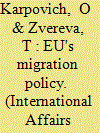

|
|
|
|
|
| Summary/Abstract |
THE development of a common EU migration policy and the approval of the new Pact on Migration and Asylum, proposed by the European Commission (EC) on September 23, 2020, is one of the most important tasks before the EC in 2021 [9]. But even if adopted, the pact would hardly be a breakthrough in efforts to solve the migration problems besetting the EU. To prove this point, we will examine the reasons for the European Commission's continued close attention to migration issues, the nature of the new proposals, and how they are perceived by politicians and the public in EU member states...
|
|
|
|
|
|
|
|
|
|
|
|
|
|
|
|
| 2 |
ID:
169510
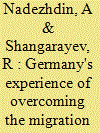

|
|
|
|
|
| Summary/Abstract |
AT A CDU/CSU PARTY CONGRESS in late 2015, German Chancellor Angela Merkel said her decision to allow all those who wished to cross the German border to do so freely was a "humanitarian imperative."1 On one hand, Germany is facing a labor shortage, which it planned to address by attracting foreigners. The plans of the German leadership to incorporate all the migrants who arrived in 2015-2016 into the national economy have not yet been fully implemented, and, conversely, the cost of supporting this group of individuals is an additional financial burden on the recipient society. It is obvious that illiterate young people who do not speak German and who wander city streets in groups and commit petty crimes are unlikely to become a driving force for modernizing industry and ensuring significant qualitative economic advancement.
|
|
|
|
|
|
|
|
|
|
|
|
|
|
|
|
| 3 |
ID:
160086


|
|
|
|
|
| Summary/Abstract |
This article adds to our understanding of the role of norms in the European Union’s (EU) response to the migration crisis by conducting a critical assessment of the EU’s anti-smuggling naval mission “Sophia”. Is Sophia in line with the normative standards the EU has set for itself in its foreign policies? Conducting the analysis in two steps in line with the main criteria of a humanitarian foreign policy model – first exploring Sophia’s launch and then assessing Sophia’s in theatre behaviour – findings suggest that although concerns for migrants at sea mobilised the initial launch of the mission, the mission is not conducted in line with key human rights principles. As the operation mandate is amended and updated with new tasks, and as the EU-NATO in theatre cooperation increases, the EU is moving further away from what one would expect of a humanitarian foreign policy actor.
|
|
|
|
|
|
|
|
|
|
|
|
|
|
|
|
| 4 |
ID:
183962


|
|
|
|
|
| Summary/Abstract |
What was behind the Visegrád Group’s (V4) pursuit of its anti-migration policy (2015–2020), despite the adverse effects on the Group’s image and position within the EU? Through the framework of role theory, the article argues that this development stems from the Visegrád Group’s self-created and performed role of ‘sovereigntist’. The objective of this role is to minimise the threat of ‘illegal’ migration as well as to diminish Brussels’ supranational influence, which the V4 perceives as threatening to the particular national identity and sovereignty of its members. The article examines the internal contradictions of this role and how it clashes with the V4’s primary integrational role within the EU structures as a ‘follower’.
|
|
|
|
|
|
|
|
|
|
|
|
|
|
|
|
| 5 |
ID:
163494
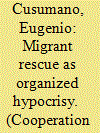

|
|
|
|
|
| Summary/Abstract |
In November 2014, Frontex started its Southern Mediterranean border monitoring operation Triton, followed in June 2015 by the Common Security and Defence Policy anti-smuggling mission EU Naval Force Mediterranean (EUNAVFOR Med) ‘Sophia’. Both operations’ outward communication has placed considerable emphasis on the conduct of maritime search and rescue. Still, this commitment was not matched by consistent action. Triton and EUNAVFOR Med have conducted a relatively limited number of search and rescue operations, prioritizing border control and anti-smuggling tasks. This article explains the gap between the European Union missions’ humanitarian rhetoric and an operational conduct primarily focusing on curbing irregular migration as a form of organized hypocrisy. Decoupling talk and action allowed Triton and EUNAVFOR Med to reconcile the conflicting expectations arising from European governments’ willingness to reduce migrant arrivals and the normative imperative to act against the loss of life at sea. However, the European Union missions’ organized hypocrisy had several negative externalities, hindering effective management of the humanitarian crisis offshore Libya.
|
|
|
|
|
|
|
|
|
|
|
|
|
|
|
|
| 6 |
ID:
148559
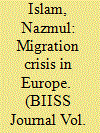

|
|
|
|
|
| Summary/Abstract |
In 2015, one of the most challenging tasks for leaders and policymakers in Europe has been to deal with the recent migration crisis therein. Despite the crisis being rooted in different parts of the Middle-east, Asia and Africa, Europe is facing its aftereffects. Because of having different perspectives like humanitarian and security issues, the situation has become complicated. As a result, response from the European Union (EU) in managing the situation has been divided. However, different measures have already been taken by the EU members and other relevant actors to find out some temporary solutions. Besides the EU, major global powers and the Gulf countries need to take additional responsibilities. For finding a durable solution, it is necessary to address root causes of the crisis and develop strategies towards the countries that help generate mass irregular migration.
|
|
|
|
|
|
|
|
|
|
|
|
|
|
|
|
| 7 |
ID:
180698
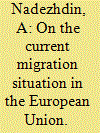

|
|
|
|
|
| Summary/Abstract |
THERE ARE CONCERNS in European countries about the possibility of recurrence of the 2015-2016 migration crisis in the near future. Doubts about the readiness of the European Union to resist a new wave of refugees from crisis regions and ensure protection of the bloc's external borders are confirmed by statistical data. At the end of 2019, Turkey, the EU's southern neighbor, experienced an increase in migration pressure when the total number of Syrian refugees in the country reached almost 3.7 million. The intensification of fighting in Idlib province in early 2020 contributed to the escalation of Erdogan's rhetoric; he has repeatedly called to stop deterring the increasing numbers of Syrian migrants from entering the European Union. As a result of the unilateral opening of the Turkish border with Greece at the end of February (it was closed on March 18 due to the threat of the spread of coronavirus), about 20,000 illegal migrants accumulated on the border. Many of them are not Syrian refugees fleeing the war but nationals of other states. For quite a lot of Afghans and Iraqis, Turkey is a transit country on their way to Europe. According to political analysts, Ankara's actions can be regarded as an instrument of pressure applied on Brussels in order to gain additional financial and political benefits over and above the EU-Turkey deal of 2016.
|
|
|
|
|
|
|
|
|
|
|
|
|
|
|
|
| 8 |
ID:
161273


|
|
|
|
|
| Summary/Abstract |
Our primary aim in this article is to explore vernacular constructions of Europe’s so-called ‘migration crisis’ from the grounded everyday perspectives of EU citizens. We do so as a critical counterpoint to dominant elite scripts of the crisis, which are often reliant upon securitised representations of public opinion as being overwhelmingly hostile to migrants and refugees and straightforwardly in favour of tougher deterrent border security. In addition to broadening the range of issues analysed in vernacular security studies, the article seeks to make three principal contributions. Theoretically, we argue for an approach to the study of citizens’ views and experiences of migration and border security that is sensitive to the performative effects of research methods and the circular logic between securitising modes of knowledge production and policy justification. Methodologically, we outline and apply an alternative approach in response to these dynamics, drawing on the potential of critical focus groups and a desecuritising ethos. Empirically, we identify a vernacular theory of ‘the border’ as information management, and a significant information gap prevalent among participants with otherwise opposing views towards migration. These findings challenge bifurcated understandings of public opinion towards migration into Europe and point to the existence of vernacular border security imaginaries beyond either ‘closed’ or ‘open’ borders.
|
|
|
|
|
|
|
|
|
|
|
|
|
|
|
|
|
|
|
|
|